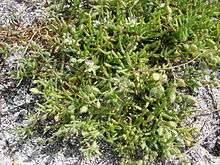Spergularia marina
| Spergularia marina | |
|---|---|
 | |
| Scientific classification | |
| Kingdom: | Plantae |
| Clade: | Angiosperms |
| Clade: | Eudicots |
| Order: | Caryophyllales |
| Family: | Caryophyllaceae |
| Genus: | Spergularia |
| Species: | S. marina |
| Binomial name | |
| Spergularia marina (L.) Besser[1] | |
| Synonyms[1][2][3][4] | |
| |
Spergularia marina, also called Spergularia salina, is a species of flowering plant in the family Caryophyllaceae (the pink family).[1] It is known as lesser sea-spurrey.[5] S. marina is a sprawling annual or sometimes perennial, with stems up to 35 cm (14 in) long. Like other sea-spurrey species, its flowers have white to pink petals, with sepals usually longer than the petals, at 2.5–4 mm (0.1–0.2 in). Plants are salt-tolerant, being found by the sea and in saline areas inland.[6]
Taxonomy
The species was first described by Carl Linnaeus in 1753 as Arenaria rubra var. marina,[7] and was subsequently treated as a full species in different genera, including Arenaria and Spergula.[8] The Plant List accepts the placement in Spergularia as of August 2016.[1] The species was placed in the genus Spergularia by J.Presl and C. Presl in 1819, who considered the specimens they saw to be a new species (S. salina), but several authors had previously elevated Linnaeus' variety to species rank, and the earliest of these brings nomenclatural priority, even if that species was transferred to Spergularia after 1819.[9]
The nomenclature has been complicated by some errors. In 1822 Wilibald S. J. G. von Besser created the name Spergularia marina, but based his analysis on an 1788 species name in Arenaria published by Albrecht Wilhelm Roth, who intended to move Linnaeus' variety to a full species. Roth was unaware that Carlo Allioni had previously, in 1785, elevated the variety to Arenaria marina, so Roth's name is now considered a homonym. Besser's name Spergularia marina is now considered to be based on Allioni's name and consequently on Linnaeus' variety name; it brings nomenclatural priority from 1785.[10] A further error that has caused authors to come to different conclusions about the correct name for the species, is a name thought to have been published by Peter Simon Pallas in 1776. That phantom name came about because Carl Friedrich von Ledebour cited it after misreading Arenaria maritima as A. marina.[2]
_-_geograph.org.uk_-_203915.jpg)
Notes
- 1 2 3 4 "Spergularia marina", The Plant List, retrieved 2016-08-03
- 1 2 "Caryophyllaceae Arenaria marina Pall. ex Ledeb.", The International Plant Names Index, retrieved 12 August 2016
- ↑ "Caryophyllaceae Arenaria marina Roth", The International Plant Names Index, retrieved 12 August 2016
- ↑ "Caryophyllaceae Arenaria marina (L.) All.", The International Plant Names Index, retrieved 12 August 2016
- ↑ BSBI List 2007, Botanical Society of Britain and Ireland, archived from the original (xls) on 2015-02-25, retrieved 2014-10-17
- ↑ Stace, Clive (2010), New Flora of the British Isles (3rd ed.), Cambridge, UK: Cambridge University Press, pp. 467–468, ISBN 978-0-521-70772-5
- ↑ "Plant Name Details for Arenaria rubra var. marina L.", The International Plant Names Index, retrieved 2016-08-03
- ↑ "Spergula marina", The Plant List, retrieved 2016-08-03
- ↑ (McNeill et al. 2012, Article 11)
- ↑ (McNeill et al. 2012, Article 41.8)
References
- McNeill, J.; et al. (Barrie, F.R.; Buck, W.R.; Demoulin, V.; Greuter, W.; Hawksworth, D.L.; Herendeen, P.S.; Knapp, S.; Marhold, K.; Prado, J.; Prud'homme Van Reine, W.F.; Smith, G.F.; Wiersema, J.H.; Turland, N.J.) (2012). International Code of Nomenclature for algae, fungi, and plants (Melbourne Code) adopted by the Eighteenth International Botanical Congress Melbourne, Australia, July 2011. Regnum Vegetabile 154. A.R.G. Gantner Verlag KG. ISBN 978-3-87429-425-6.